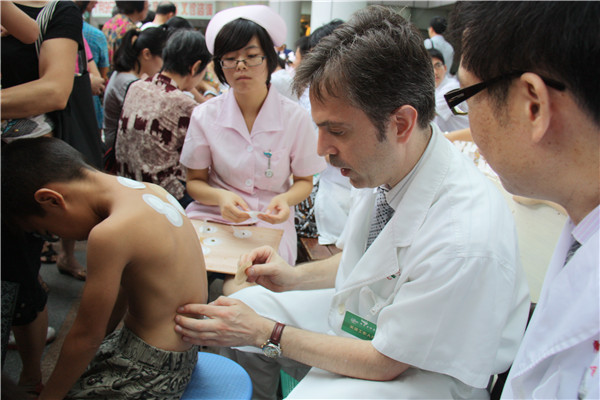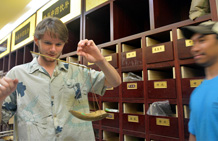
TCM gaining recognition with Western institutes
Source:China Daily
Xu Jingxi In Guangzhou And Wang Xiaodong In Beijing
Updated: 2015-10-06
 |
|
Paul Ryan treats a boy with sanfutie plaster, in July, 2012. [Photo provided to China Daily] |
The government will also take measures to nurture big enterprises that provide TCM service internationally, and encourage TCM colleges in China to intensify international cooperation and provide TCM education overseas, according to the plan.
Lu from the Guangdong Provincial Hospital of Chinese Medicine called for more government funding on international cooperative projects initiated by Chinese universities and research institutes. For example, government subsidies cover less than one-tenth of the huge expenses on the cooperative project with the Royal Melbourne Institute of Technology.
More importantly, the Chinese government should promote the legalization of TCM practitioners in other countries, like Australia did in 2012, Lu said.
"Legalization can protect the rights of overseas TCM practitioners and also supervise their behavior. It will spoil the reputation of TCM if some unqualified or inexperienced practitioners work underground without legal supervision overseas," she said.
"Also, the Chinese government should ask foreign countries to set standards on developing and registering Chinese patent drugs together, rather than using their own standards to assess our products," Lu added.
"TCM may break the fortress and enter the mainstream markets overseas in five to 10 years if the government can create such a favorable environment."
The first Chinese medicine center to train doctors in Central and Eastern Europe - the Czech Chinese Research Center of Traditional Chinese Medicine in Prague - was opened in June.
It is a joint project by Shuguang Hospital, affiliated to Shanghai University of Traditional Chinese Medicine, and the University Hospital Hradec Kralove.
In June, the United Kingdom's Medicines and Healthcare Products Regulatory Agency also accepted an application for approval of Isatis Cold and Flu Relief, based on Radix isatidis (banlangen in Chinese).
The application to sell the popular Chinese medicine in the UK was submitted by Phynova, based in Oxford, in collaboration with TCM manufacturer Xiangxue Pharmaceuticals.
It could take the agency 210 days to make the decision. The application sends a positive signal for companies making TCM products, analysts say, following the UK's decision in 2013 to stop selling unlicensed herbal medicines by the end of that year.

World Family Summit
The World Family Organization was founded in Europe in 1947 and headquartered in Paris.
Link: / World Health Organization / United Nations Population Fund / UNICEF in China
Copyright 2014 National Health and Family Planning Commission of the PRC All rights reserved






